"Once you start reading Marvin Cohen, it's very hard not to start thinking like him and then eventually talking like him, which can raise the eyebrows of your more conventional friends. His stream-of-consciousness paragraphs are like delicious Christmas puddings, as if Virginia Woolf had hired a wild group of Restoration writers like Sheridan and Congreve to make her desserts for her. All paragraphs are served with a brandy-infused hard sauce of cold, blunt frankness. Unforgettable, and you'll beg for more."
— Wallace Shawn
"In Marvin Cohen one senses the metaphysical thirst, as he questions the notion of reality, as he distorts accepted relationships of time and death, as he approaches dark subjects with the good-natured humour reminiscent of Benjamin Péret, and particularly as he demonstrates his extraordinary power over words and word associations that break down the expected ones."
— Anna Balakian, Surrealism: The Road to the Absolute (1984)
Books
Pete, the Photographer & Other Impressions
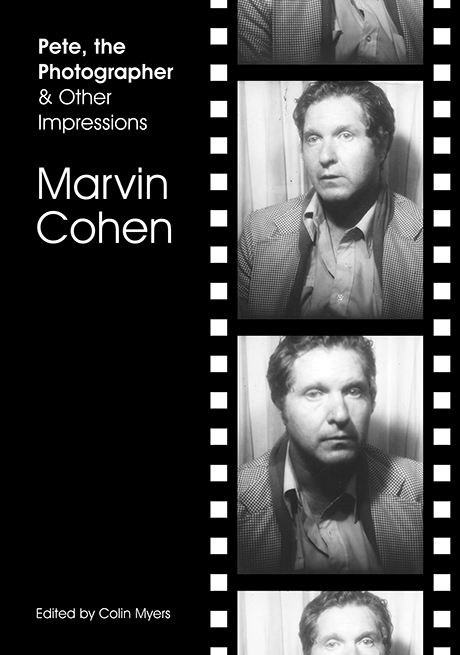
Tough Poets Press (2025), 322 pages
Edited by Colin Myers.
Fifteen previously unpublished short stories and dialogues written in the 1970s and 1980s.
Loving Candace
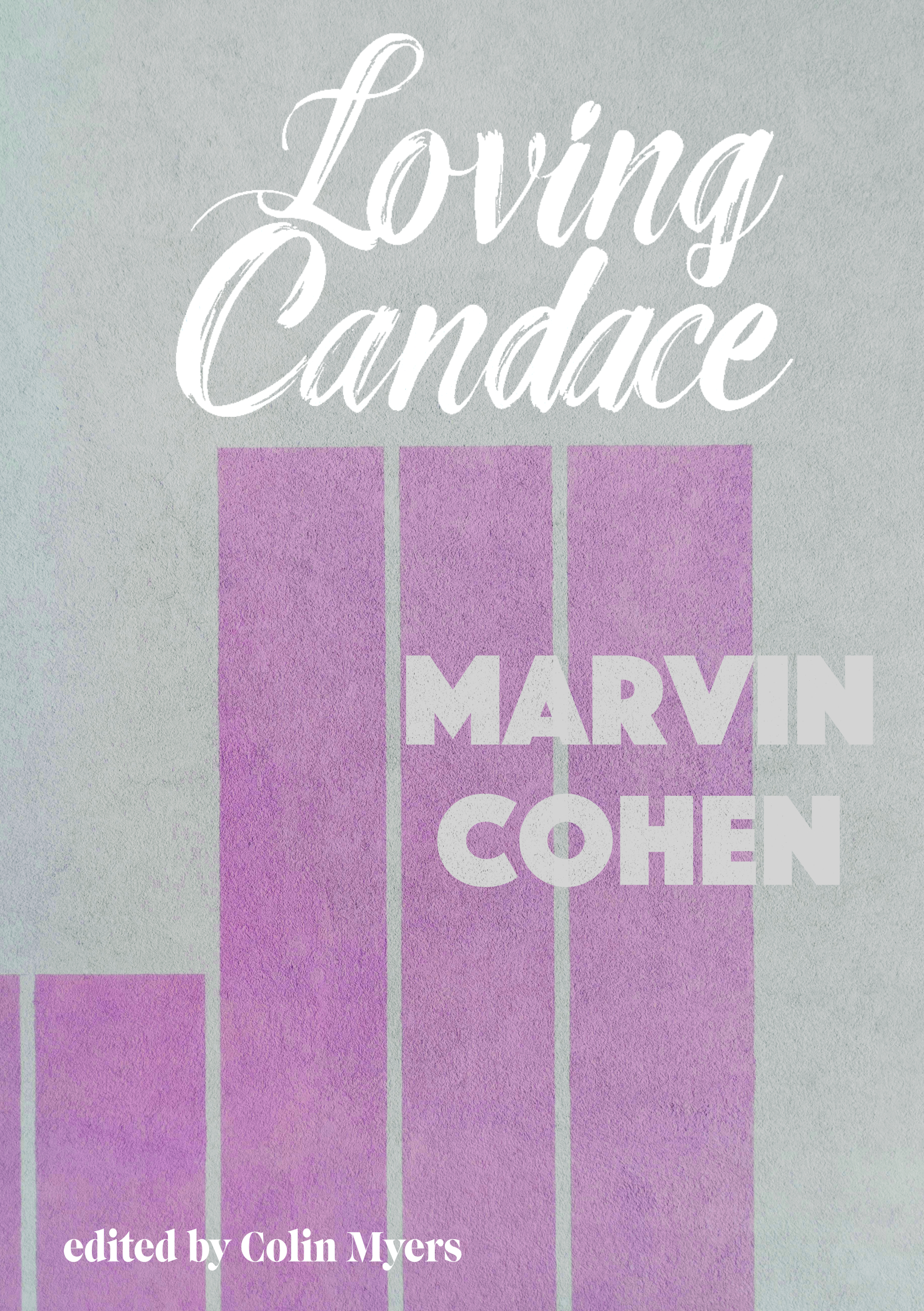
Sagging Meniscus Press (2024), 218 pages
Edited by Colin Myers.
Loving Candace brings together Marvin Cohen's tributes to his wife of many years, Candace Watt, written both before and after her death on September 22, 2023, along with a number of broader reflections on the nature of memory and friendship, all composed within the last few years of Marvin's long career.
His tributes to Candace may be viewed as one work: the earlier pieces rejoicing in their companionship, the later pieces often painfully raw and ruminative, in struggle with unfathomable loss.
Trying to Fool Death
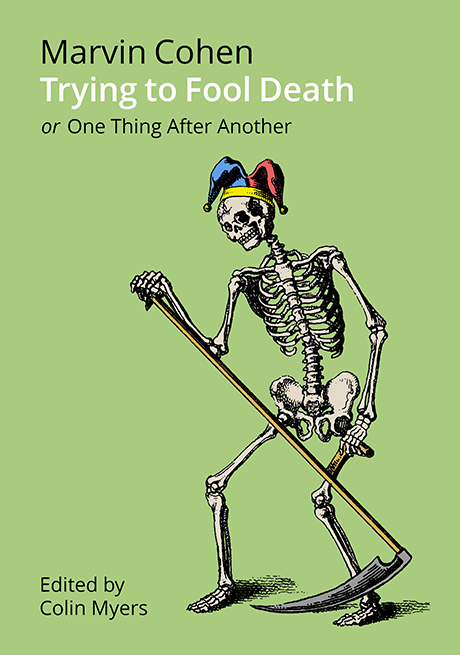
Tough Poets Press (2023), 306 pages
Edited with an introduction by Colin Myers.
This book comprises verse and dialogues drawn from Marvin's almost daily emails to a group of friends. It focuses on Marvin's acute awareness of his mortality; on death and living, on memories, on friendship and lost friends. The pieces obsessively work and rework these themes, with a viewpoint varying from the joyous to the despairing, and from the stark to the absurd.
To help achieve his goals, Marvin delights in tropes such as conundrums, contradiction, punning, extended lists and elegant variation. He revels in long, complex titles for both dialogue and poetry, sometimes to the extent that his titles can be read as separate pieces. In his poems he likes multiple rhymes and dubious half-rhymes whilst foregoing formal rhythms, but in his dialogues he is happy to burst into verse.
How, Upon Reflection, To Be Amorous
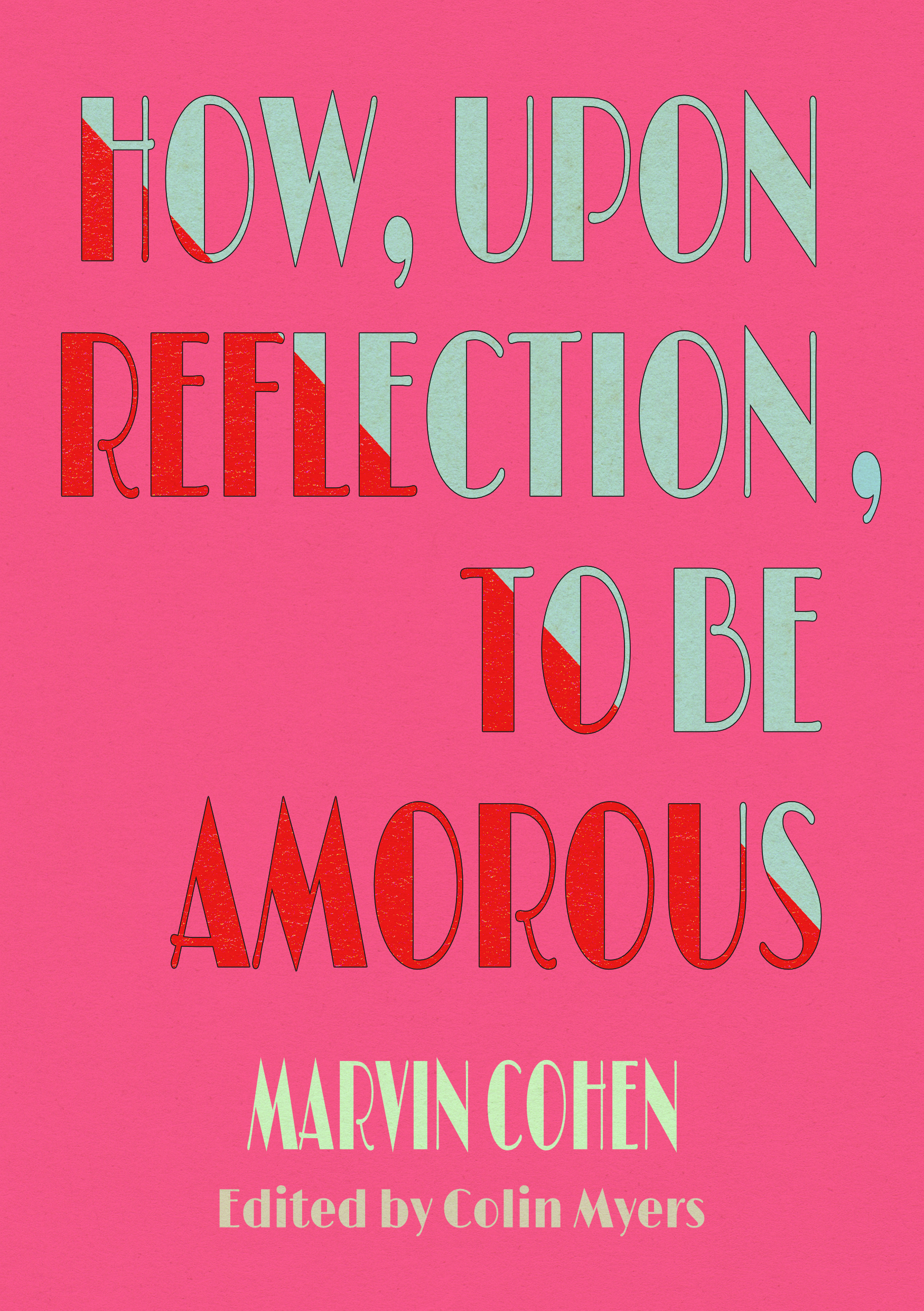
Sagging Meniscus Press (2023), 280 pages
Edited with an introduction by Colin Myers.
Marvin Cohen, born in 1931, has been writing about love for as long as he remembers. This anthology samples his works across a variety of formats; dramatic dialogue, essay, verse, epigram, short story and novella. It ranges from lust to love, from frustration to fulfillment, from sex to separation.
Booboo Roi
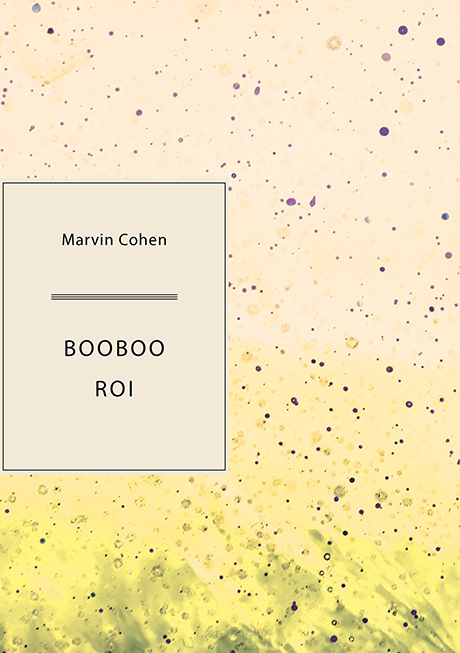
Sagging Meniscus Press (2021), 94 pages
Marvin Cohen writes of Booboo Roi, his playfully anti-theatrical adaptation of Alfred Jarry's Ubu Roi: "In the 1970s or 1980s I read Barbara Wright's >Ubu translation, which inspired me with its sheer royal barbarity of being brutal and decisive to any opposition: pure powerful selfishness. I wrote this play as a compensation for being poor, more than half deaf, and growing up in Brooklyn with poor parents . . . I envied my middle class contemporaries' privileges. I felt powerless and inferior to everyone. I had childishly daydreamed of having power over everyone, ruthlessly tyrannical, so I put myself in Ubu Roi's Booboo's shoes, and got imaginary literary revenge on the world."
The Hard Life of a Stone and Other Thoughts

Sagging Meniscus Press (2021), 280 pages
Edited by Colin Myers.
Drawn both from previously unanthologized published work and from the author’s personal horde of typescripts from the 1960s to the 1980s, this collection of stories centers around philosophical themes: the awareness of existence and experience, of reality and truth, and the relativity of time and place.
Questions to Ask Before Proceeding
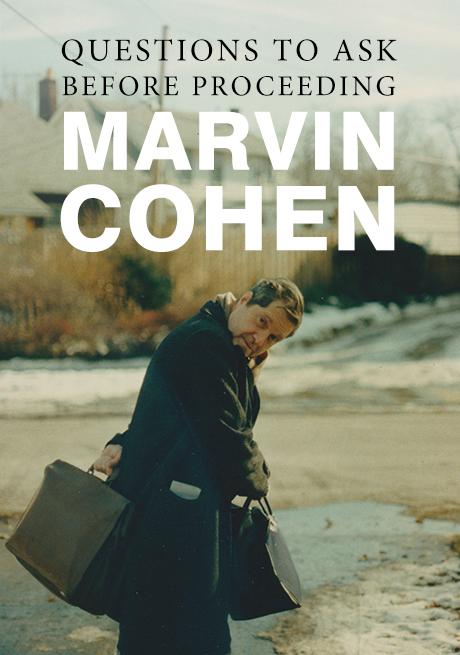
Tough Poets Press (2021), 325 pages
Nine previously unpublished short stories written in the 1960s and 1970s.
A Sincere Scientific Attempt
The Struggles of a Freelance Genius
To End Unhappiness Forever
Bill Cole's Soul's Sole True Pure Love
High Sophistication And Simple Love
Love at the College Level
Posing for a Novel
The Publisher Defending the Author
A Reverse Television Interview
Conversations and Versifications
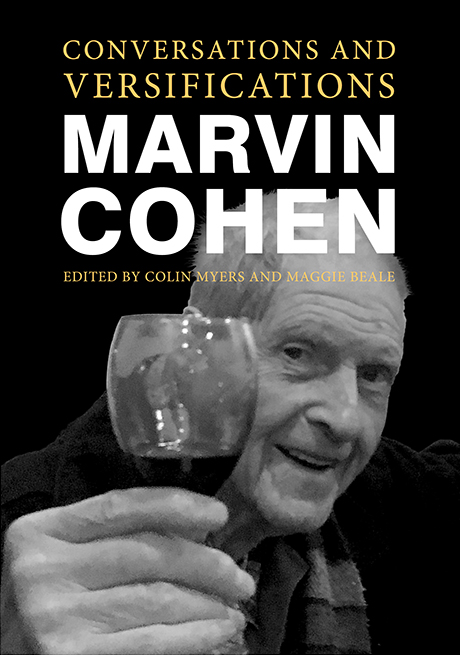
Tough Poets Press (2021), 326 pages
Edited by Colin Myers and Maggie Beale.
The first part of this book comes from Marvin Cohen's big shoe-box of unpublished typescripts, mainly dating from the 1970s and 1980s. The rest comprises dialogues, monologues, sketches and verse selected from his recent emails to a number of friends.
Plays on Words
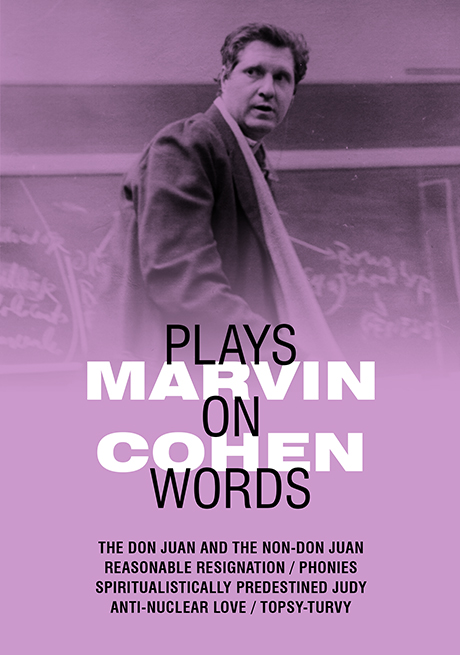
Tough Poets Press (2020), 288 pages
Compiled and edited by Colin Myers and Rick Schober.
Six satirical, humorous, and somewhat surreal plays written in the early 1980s.
The Don Juan and the Non-Don Juan (with James Milton)
Reasonable Resignation
Phonies
Spiritualistically Predestined Judy
Anti-Nuclear Love
Topsy-Turvy (with Thomas Riccio)
Life's Tumultuous Party: Reduced to its Essential Partycycles
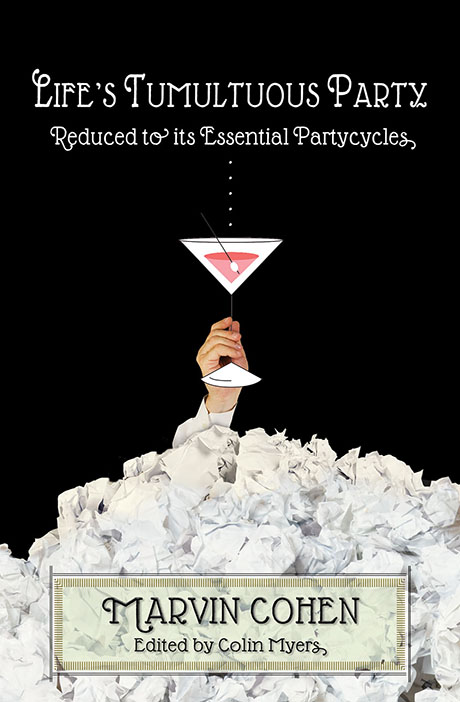
Sagging Meniscus Press (2020), 234 pages
Edited by Colin Myers.
"Parties are my library," says notorious party-crasher, Lower East Side denizen, and exuberantly idiosyncratic prose stylist Marvin Cohen. In this surrealistic suite of stories, dialogues and other party-dances, Cohen dissects party-going as both celebrant and philosopher, "romping in the wildness and mystery of parties" and finding there the "pulse and throb and beat" of our individual and collective natures. Edited and introduced by Colin Myers.
"What the Nobel Prize winner Elias Canetti deconstructed about multiple gatherings in his brilliant Crowds and Power, Marvin Cohen does with laughs for party-goers in his definitive Life's Tumultuous Party. Cohen—a literary treasure at 88, the very last of the Beats—is overdue for his Nobel."
— Paul Theroux
Sadness Corrected: New Poems & Dialogues
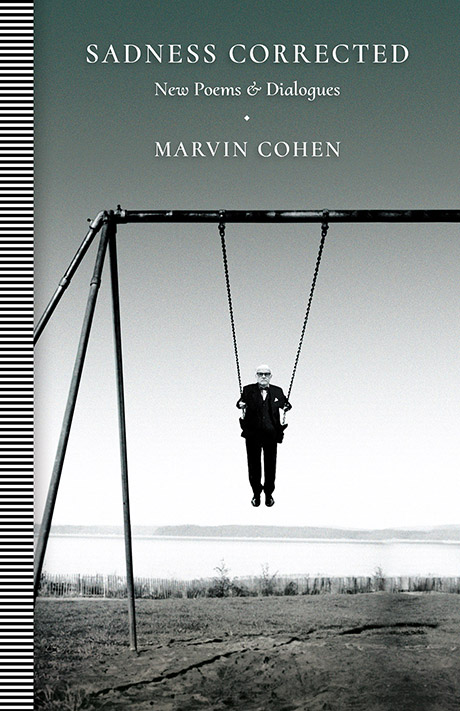
Sagging Meniscus Press (2019), 300 pages
In this prodigious outpouring of short pieces, Marvin Cohen looks into every corner of human affairs, even the darkest, with a joyful spark that never goes out.
Women, and Tom Gervasi
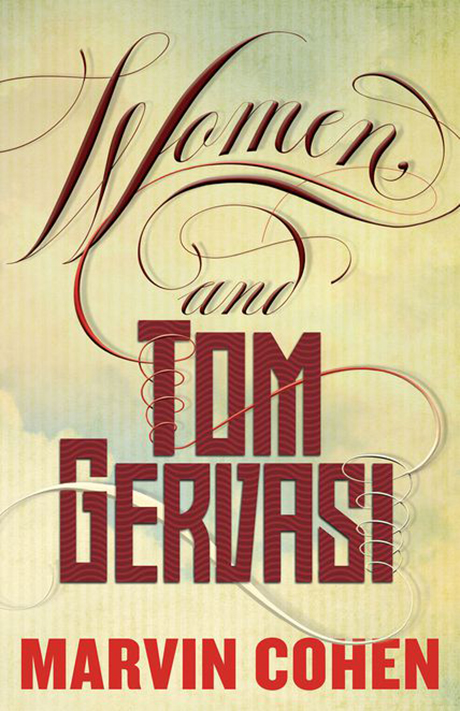
Sagging Meniscus Press (2018), 276 pages
Every possible life — charmed, doomed, or both — of a Don Juan of 1970s New York, is captured, in its every conceivable inflection, in Marvin Cohen's comic episodic novel Women, and Tom Gervasi. The philanderer at the heart of the novel is hopelessly, effortlessly, universally, even fatally attractive to women. His oversized invulnerability is both monstrous and very recognizably human. Gervasi is a kind of necessary mythic extrapolation of the ego, an imaginary counterweight to the reality of self-loss, a King Midas whose limitless power is his own undoing, and who is ultimately shown, through Cohen's Cubist technique of exhaustively presenting every perspective on his character, to exist in a kind of Hell of spiritual isolation and inability to love. As always, Cohen writes with a vigorous wit; his poetic dialect reforges the English language into utterly original, surprising and delightful forms. Written in the late '70s and never before published, this novel is one of a pair with Inside the World: As Al Lehman (published simultaneously), Cohen's novel about a "non-Don Juan."
Inside the World, As Al Lehman
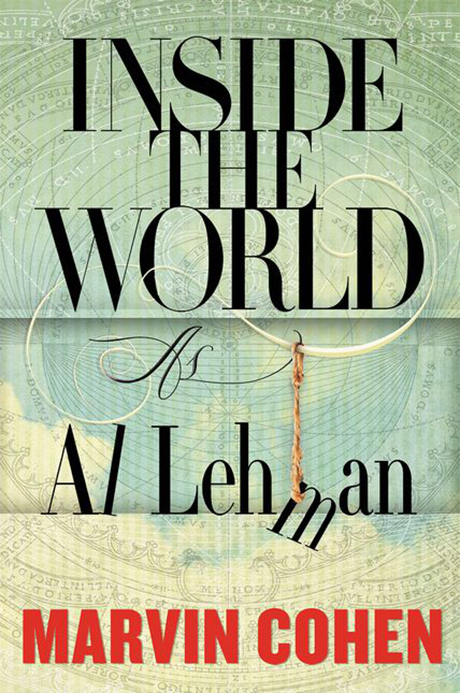
Sagging Meniscus Press (2018), 240 pages
Al Lehman is a bourgeois Everyman, whose true nature is mysterious, radically unformed, incomplete, and frustrated, even as the quotidian circumstances of his life are drearily grounded in a fixed temporal reality. In this episodic novel, comic and philosophical, written in the late '70s in Cohen's highly idiosyncratic and extraordinarily poetic language, different aspects of Lehman's quest to exist in the scope of finitude, in the belly of a universe that does not fully nourish him, but is the source of all nourishment, are brilliantly distilled.
Inside the World, As Al Lehman is a companion novel to Women, and Tom Gervasi, whose central figure could be Lehman's wish-fulfilling dream projection: a Don Juan who exists in a world of limitless physical and emotional gratification. Taken together, the two novels comprise a kind of comedic Either/Or in which are explored a wide range of the merits and dismerits of the real and ideal.
Run Out of Prose
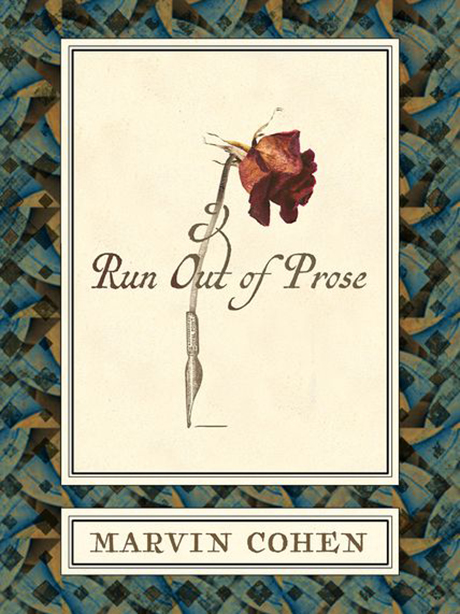
Sagging Meniscus Press (2018), 226 pages
When asked by a friend why he recently he had been writing only poetry, Marvin Cohen, octogenarian author of many novels, stories, essays and plays, quipped that he had "run out of prose." It would be as apt to say that, in these delightfully carefree rhymed homilies about the irreducible vagaries of life, death, and evolution, he has leapt off the ground, into the air.
Five Fictions
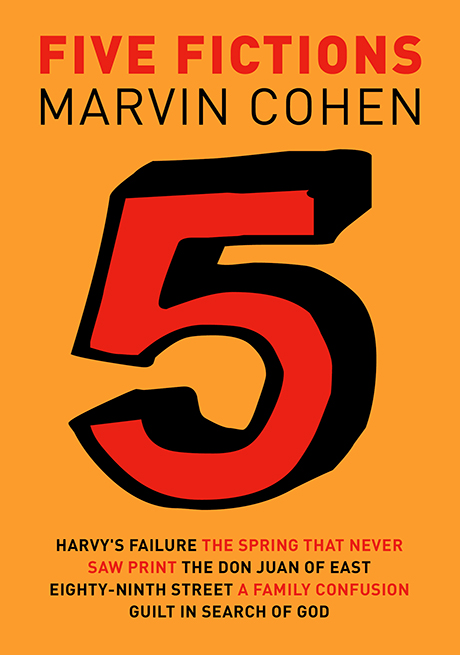
Tough Poets Press (2018), 220 pages
A collection of five previously unpublished seriocomic novellas and short stories written in the mid-1960s:
Harvy's Failure
The Spring That Never Saw Print
The Don Juan of East Eighty-Ninth Street
A Family Confusion
Guilt in Search of God
Baseball as Metaphysics
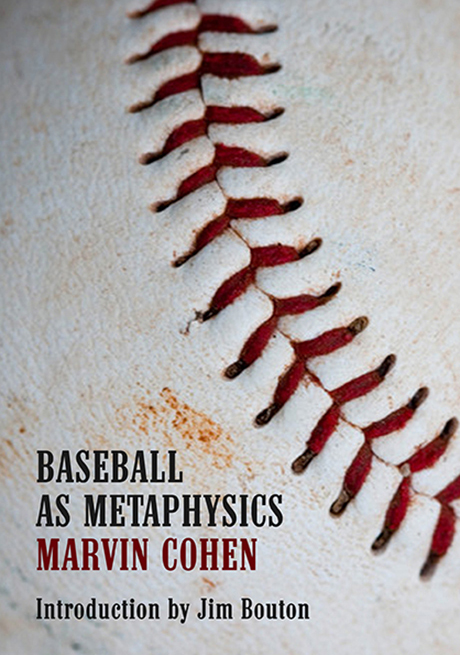
Tough Poets Press (2017), 112 pages
"Cohen is a superfan, and he has written an intellectual manual for his co-religionists. They know who they are and they will cherish this manual. But anyone who has spent a soft, green afternoon, his shirt open at the throat to the sun, the whistles and chatter of the infield drifting up to the edge of his mind, watching, absorbing, taking in a baseball game, will cherish it."
— From the introduction by Jim Bouton, former Major League pitcher and author of the 1970 bestseller Ball Four.
Originally published in 1974 as Baseball the Beautiful: Decoding the Diamond, Cohen explains that the original publisher took the liberty of changing the book's now-restored title "for commercial feasibility and to bring in the lumbering lowbrow audience." This new edition contains a later essay that did not appear in the original, and the author has also written a new foreword.
"Probably the most sympathetic book ever written about the game."
— New York Post
"Cohen's essays on the sport never become trapped in sentimentality or overblown analysis — as pleasing as a perfect game with two out in the ninth."
— Penthouse
"Cohen approaches baseball as the artist does a great work of art — it contains, for him, the metaphysical, the holy, the myth, that which lives beyond us, love. Seeing baseball as the supreme art, we are drawn into the book, and close to whatever art we are involved in, close to life."
— Margins
"Unlike any book on baseball that you have ever read."
— Arizona Republic
The Self-Devoted Friend: 50th Anniversary Edition

Tough Poets Press (2017), 166 pages
50th-anniversary edition of Cohen's debut fiction. Not quite a novel, the book is best described as a series of humorous philosophical dialogues between the narrator and his "other" self, touching on a vast array of subjects such as birth, love, art, nature, religion, death, and everything in between.
A mere 1,500 hardcover copies of The Self-Devoted Friend were printed in London by publisher Rapp & Carroll Limited in 1967, 750 of which were imported by New Directions Publishing for distribution in the United States. According to Cohen, New Directions publisher James Laughlin explained his decision behind the very limited edition by saying it was "only for the happy few." Despite its overwhelmingly positive critical reception, no further copies of the book were ever produced. Completely reformatted, this new paperback edition contains the full text of the original and the author has also written a new brief introduction.
"When I was an unpublished writer 55 years ago, I lived in the same crummy tenement as Marvin Cohen in New York, and got to know him and his extraordinary writing. To me he was the Beckett of Avenue B — funnier, more accessible, but just as determined to show us the world in a new way. Cohen is the chronicler of frustration, and The Self-Devoted Friend is just one of his masterpieces."
— Paul Theroux
"It is rare these days — perhaps, any days — to come across a work that not only reveals a striking, fresh talent, but stands outside current literary preoccupations. What Mr. Cohen has is his own: a joy in language, and an eye, at once innocent and shrewd, for the paradoxes inherent in the human condition. He puts both language and people through their paces, stands them on their heads, and hugs them to his heart in what amounts as a tour de force of serio-comedy, a sort of superb clowning in which pathos and absurdity intertwine as they do in a Charlie Chaplin film."
— Alice S. Morris, The New York Times Book Review
"Cohen surrealistically juxtaposes ideas, seeks irrational and fantastic links, but for the high purposes of verbal comedy and linguistic entertainment."
— The New Statesman (London)
"Marvin Cohen's wacky humor has something of Thurber, something of Steinberg, Buster Keaton, the surrealists, the pataphysicians. The Self-Devoted Friend is a book that should be read immediately by all who gladly recognize themselves to be half crazy."
— Thomas Merton
"Such discontinuous fictions as Finnegans Wake or Naked Lunch or Marvin Cohen's The Self-Devoted Friend would store more suitably than nineteenth-century novels."
— Richard Kostelanetz, Works
Others, Including Morstive Sternbump: 40th Anniversary Edition
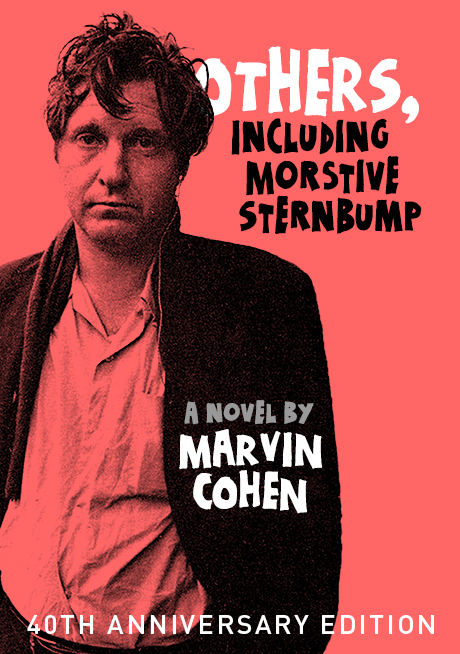
Tough Poets Press (2016), 248 pages
This new paperback edition has been completely reformatted and contains the full text of the original novel published in 1976. In addition, it includes the transcript of the 23-minute December 24, 1976 Reader's Almanac interview with Marvin Cohen conducted by Walter James Miller courtesy of New York Public Radio (WNYC 93.9 FM), as well as a new brief introduction by the author.
"Like something out of the brain of a poetic trash compactor fed on ten years' accumulation of The New York Review of Books and As the World Turns. Cohen is bewitched by the novelty of the novel. He uses plot and language not to tell a story, but to discover and utilize all the lavish possibilities and pleasures these provide. This book is a writer's lark, yet also a benign ramble through the Disneyland of a literary man's literature."
— Ron Whyte, Soho Weekly News
"[Cohen] has put his sophisticated hand into the wiring of the language and twisted it impishly. ... The reward for your attention is that you hear a new voice and a new kind of surreal music."
— Raymond Sokolov, The New York Times Book Review
"An appeal that lingers beyond the final page. ... A brilliantly interpretive mind."
— Houston Chronicle
How to Outthink a Wall: An Anthology
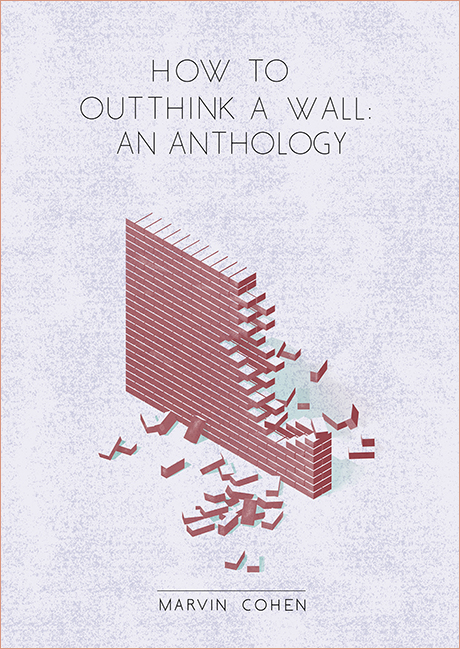
Verbivoracious Press (2016), 480 pages
This anthology collects the following volumes of Cohen's short fiction: The Monday Rhetoric of the Love Club and Other Parables, Fables at Life's Expense, The Inconvenience of Living, How the Snake Emerged from the Bamboo Pole but Man Emerged from Both, and Aesthetics in Life and Art. It also includes approximately 40 pages of new work.
Aesthetics in Life and Art
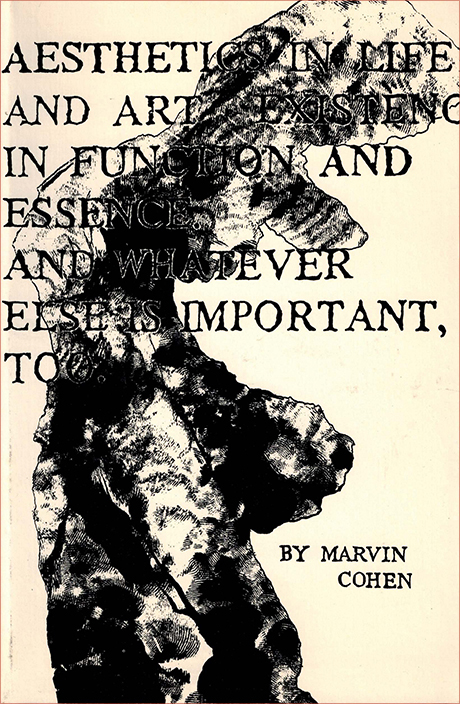
How the Snake Emerged from the Bamboo Pole but Man Emerged from Both
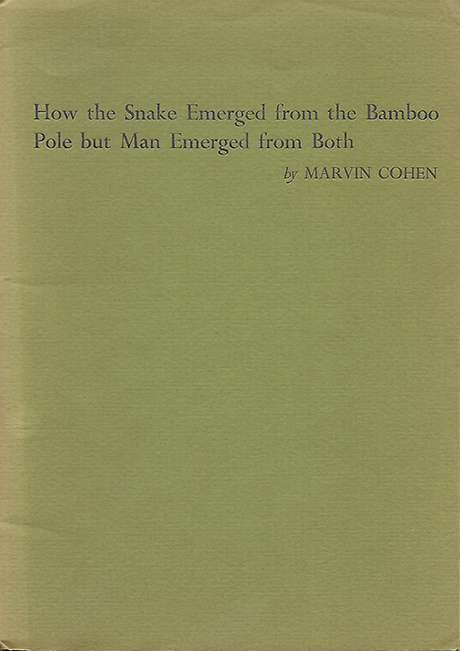
The Inconvenience of Living
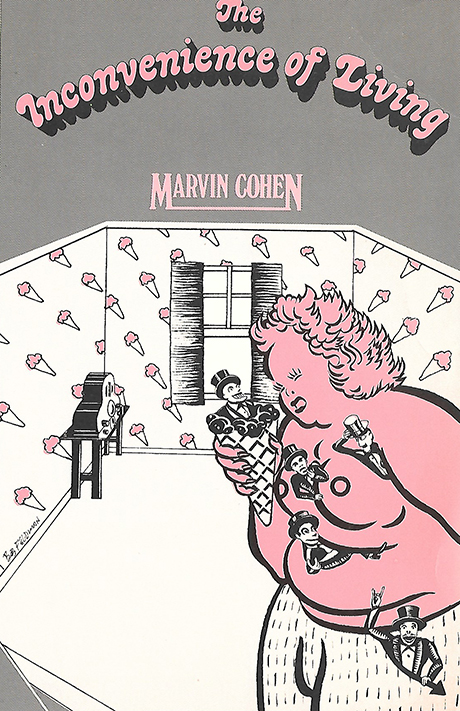
"With sage and quiet humor Cohen whittles at the ludicrous dimensions of human folly and cuts us to the quick with his fables, parables, dialogues, and other delightful departures from the conventions of fiction It's always a pleasure to come across Cohen in a magazine piece; here, too, he again proves to be an antidote to the inconvenience of living."
— Publishers Weekly
Others, Including Morstive Sternbump
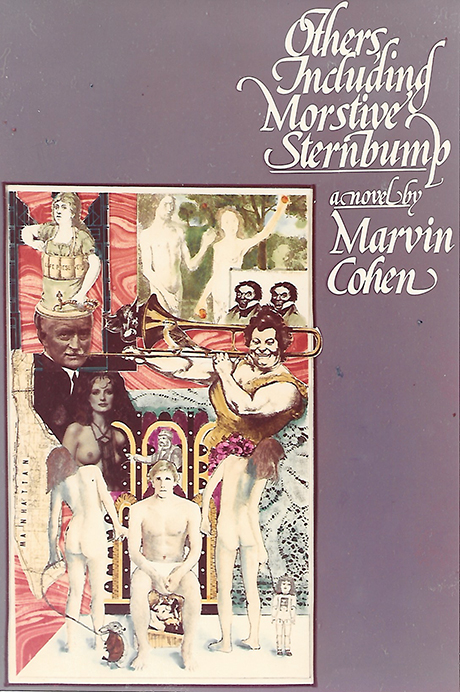
Fables at Life's Expense
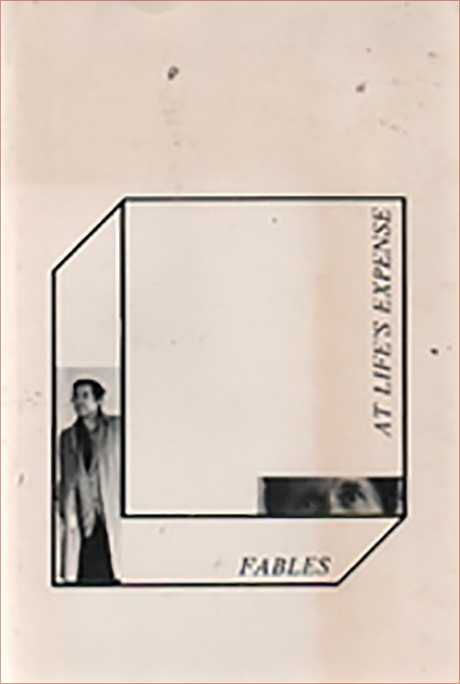
"The narrator in Cohen's typical fable purposely locks himself into a logic that must lead to frustration and failure. Instead of despairing, however, he then revels in the irony of the situation and finds consolation in the triumph of art (the fable) over life. He reaches rare and dizzying heights of metaphorical perfection in describing paradoxical emotional states. For serious collections of contemporary experimental fiction."
— Library Journal
"Verbal and situational fun. Attractive comic fantasia. Cohen writes in a style that pulses with energy."
— Publishers Weekly
Baseball the Beautiful: Decoding the Diamond
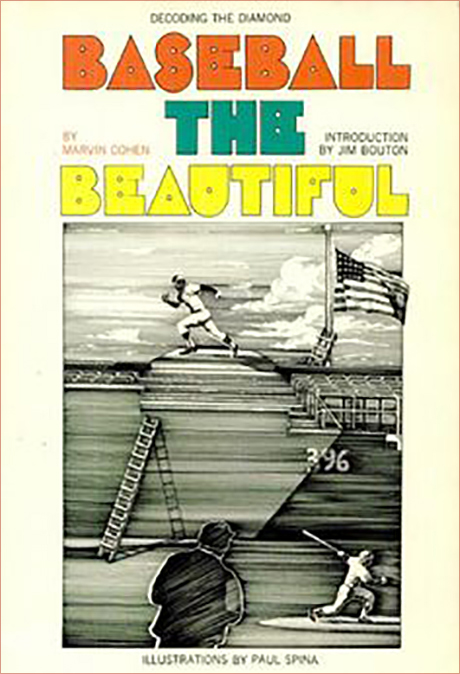
The Monday Rhetoric of the Love Club and Other Parables
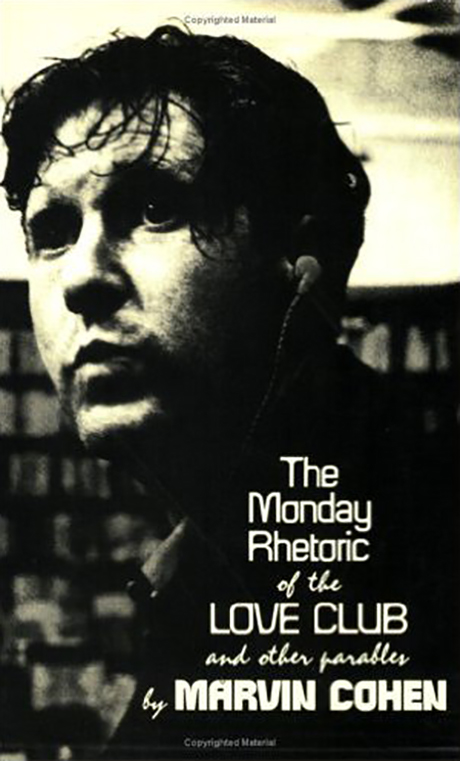
"Marvin Cohen is a virtual original. He is at his best in his dialogues, excellent theater of the absurd — zany, witty, progressing by disrupting and revealing pun to open up new areas of insight. There is an exuberance about his work which shows in his delight of words: many phrases are sheer delight. Cohen is also a satirist of thrust, touching upon many matters — sex, love, religion — but some of his most moving pieces deal with loneliness. Even here, however, his vitality and vigor encompass the emptiness of his subject and enable us to see the human situation in context. He is never dwarfed by his material, nor does he sentimentalize it. His touch illuminates and moves on. Perhaps this book will create for him the following he deserves."
— Library Journal
"His stories are bursting with inventiveness, and have a way of posing awkward questions — this, when most of the world's story writers are content with dry observations, or mere character assassination."
— The Times Literary Supplement (London)
"Cohen thinks all our lives shade very close to surrealism and, set down, his observations are often wildly funny. Add his wonderful facility with words and you have one of the most delightful books of the season."
— Newsday
Dialogues
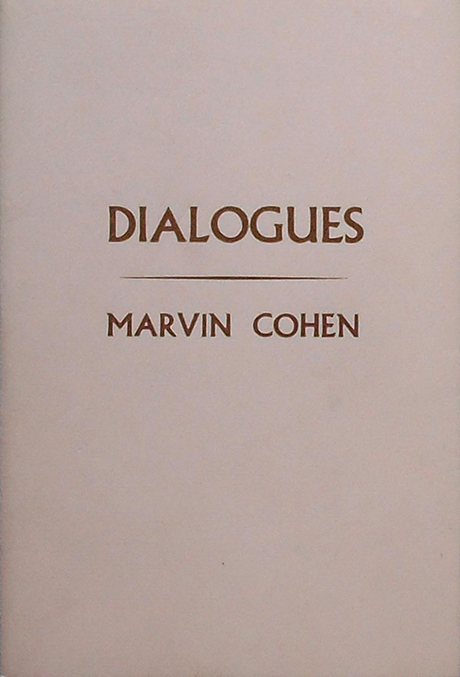
The Self-Devoted Friend
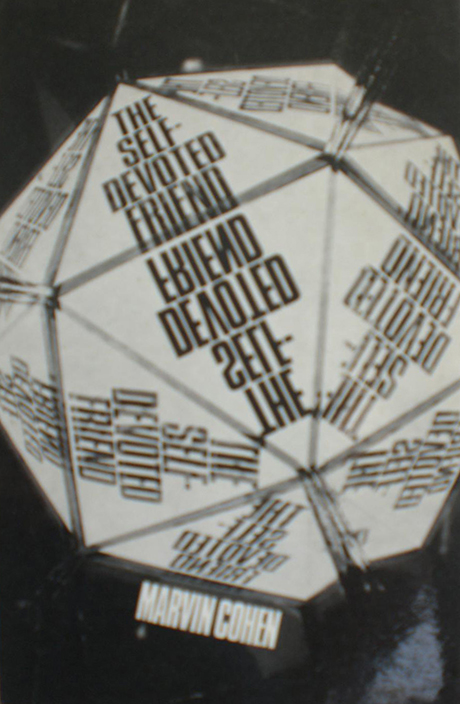
Plays
The Don Juan and the Non-Don Juan (1980)
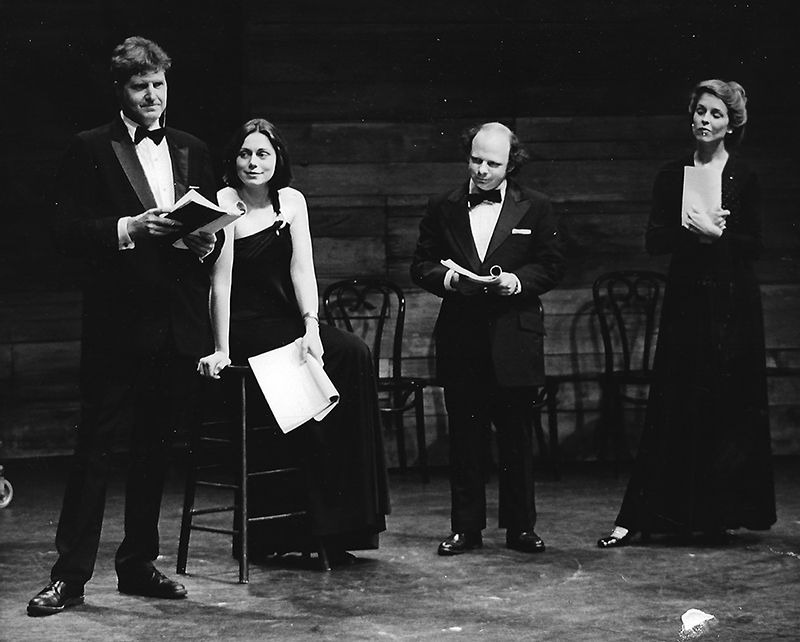
From left: Marvin Cohen, Alma Cuervo, Wallace Shawn, Jill Eikenberry — May 12, 1980 (Photo: Carol Rosegg)
Based on two unpublished episodic novels by Marvin Cohen, (Women, and Tom Gervasi and Inside the World: As Al Lehman), The Don Juan and the Non-Don Juan was was first performed at the New York Shakespeare Festival as part of the Poets at the Public Series. Staged readings featured Richard Dreyfuss, Keith Carradine, Mimi Kennedy, Wallace Shawn, and Jill Eikenberry, with a full production in London.
"Two different separate men who never even heard of each other are alternately displayed as having to do in comparative parallel contrast of ways with, in various forms, women. One of the men is the latest in the line of the Don Juans, from the lengthy literary tradition as depicted by Byron, Shaw, Moliere, and Mozart/Da Ponte. The other man would also like to be a Don Juan: his attempts on that score demonstrate that he's not.
"Among the hordes of women encountered by these unmutual men are an office secretary who gets one of them fired; a nunhood-renouncing nun; a monthly duo named May and June; a rich gangster's smitten wife; a flowery trio named Iris, Rose, & Lila; women at parties; women at dinners; women in bed; women in the rain.
"Plenty of conflicts abound. To settle one of them, God puts in a majesterial appearance.
"At the end of this theater presentation, there's no loss of conclusions that an audience member may (or for that matter may not) arrive at. Among the theatrical approaches to the Don Juan legend or the failure thereof, the comic gets treatment. Other devices help out, just in case."
— Marvin Cohen
Necessary Ends (1982)
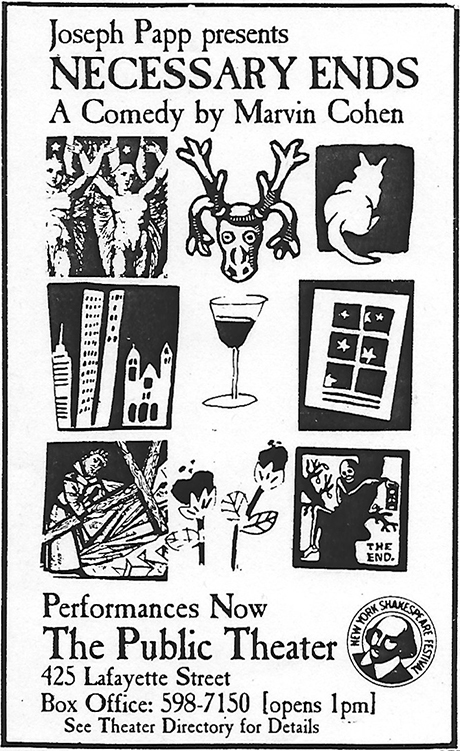
Necessary Ends involves two couples who tangle in a philosophical farce about love, language, sex, time, and death. A collaboration with the director James Milton, it was privately auditioned to producer Joseph Papp, with Wallace Shawn, Andre Gregory, Angela Pietropinto, and Gretchen Van Riper in the four roles.
"The term ‘character' was coined with Marvin Cohen in mind. A gentle observer of the unpredictable and slightly absurd, Marvin has a fondness for mankind that is unmistakably his own. Sometimes I think of him as a comedian-chronicler standing at the center, his head turned slightly toward your line of speaking to accomodate his hearing aid. Necessary Ends is the sum of these parts, as Marvin positions and repositions people within relationships, that ever-aimed ear to the pun and odd bits of conversation, as though he's walking slowly through a cocktail party. The strength of his writing stems from his baroque sense of humor and his ability to see both the world and himself as wonderfully delightful miscreaants."
— Joseph Papp, Plays from the New York Shakespeare Festival
Necessary Ends originally appeared in Plays from the New York Shakespeare Festival in 1986. It was reprinted by Broadway Play Publishing Inc in 2022.
Topsy-Turvy (1986)
Phonies (1988)
Love Unfairly Tested (1988)
Biography
In response to a request for information regarding his life and career, the subject of this website graciously provided, in distinctive Cohen-esque fashion, the following third-person autobiography:
When Marvin Cohen was offered space for this website biography, he confessed: "I've risen from a lower class background to a lower class foreground."
Described as a poet, humorist, surrealist, essayist, etc., he has published numerous books, not counting reissues. His play The Don Juan and the Non-Don Juan has been acted in by Richard Dreyfuss, Keith Carradine, and Wallace Shawn, plus actors in England, and translated for German TV. His shorter writings — stories, parables, allegories, essays — have appeared in more than 80 publications, including anthologies from New Directions and other major publishers, plus The New York Times, The Village Voice, The Nation, Harper's Bazaar, and Vogue. He's given loads of readings in New York and London, often assisted by dialogue partners who acted like actors and sometimes even were.
Despite very little college education, he taught creative writing at the New School, the City College of New York, C.W. Post of Long Island University, and Adelphi. He was never imitated by years of students, much to their credit.
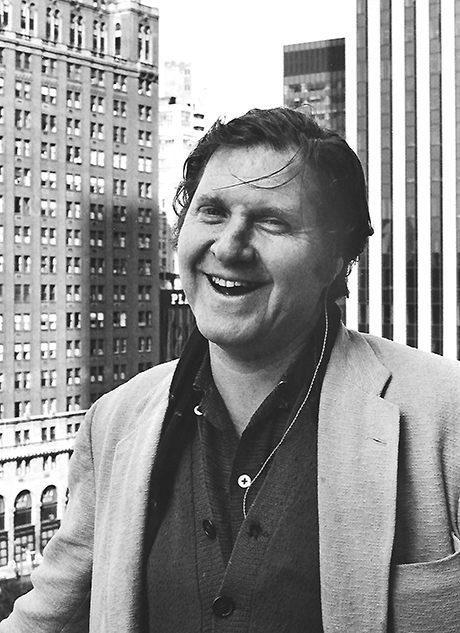
1970s (Photo: Tom Gervasi)
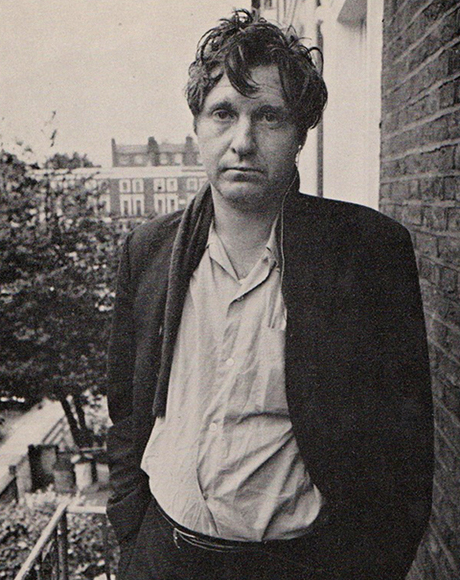
1960s (Photo: Jean Shrimpton)
Born in Brooklyn in 1931 during the recession, Cohen took art classes at Cooper Union, but oils and canvas cost too much and writing cost very little. Reduced to 35% hearing from infantile disease, he lived in a cold-water flat starting at $31 a month in Manhattan's Lower East Side. He notoriously crashed a lot of parties and receptions for extra food, drink, and free socializing not to mention flirting (harmless, of course). His odd jobs included messengering, mink farming, children's camp counselor, market research, post office temp, proofreader, ineffectual gardener, and merchant seaman on oil tanker to Cuba; but he was fired virtually more frequently than hired, if at all possible.
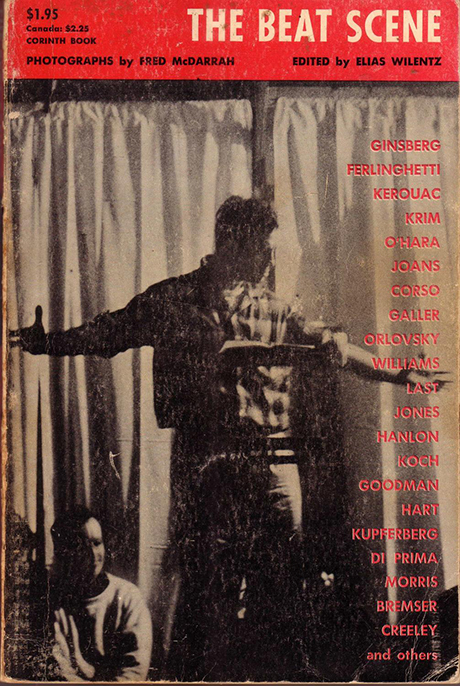
The Beat Scene (Corinth Books, 1960)
His first published piece appeared in The Beat Scene (Corinth Books, 1960) alongside works by Jack Kerouac, Allen Ginsberg, and Gregory Corso:
Prose Poem
I woke up feeling too good to be true. That was my first mistake.
I yawned, and with powerful ease of breath blew the ceiling away from my bedroom, until the lady upstairs fell on me with violent curiosity of desire.
I married her the next day to facilitate our growing friendship. It was a marriage of convenience, since she was intolerably wealthy and I was sufficiently poor.
She made me move upstairs. We cooked our meals by rubbing our bodies together while holding the raw meat and vegetables. It was amazingly effective. Animal heat, as yet unexploited, contains unlimited possibilities as a source of energy. We thought of selling ourselves to the government: But that would be prostitution.
This story ends, though, sadly: We loved each other to extinction. Even our graves are invisible.
Prior to his death on March 15, 2025, Cohen lived for many years in New York City with his wife, a retired paperback editor. He played softball regularly until his late 80s, and identified himself as a Yankee fan in his book Baseball the Beautiful, title-changed by its first publisher from the original Baseball as Metaphysics for commercial feasibility and to bring in the lumbering lowbrow audience, but now reissued under its originally intended title.
By 2016, with the exception of The Monday Rhetoric of the Love Club and Other Parables, (New Directions), Cohen languished out of print. However, Boston-area independent publisher Tough Poets Press, Verbivoracious Press, based in Glasgow and Singapore, and most recently Sagging Meniscus Press of New Jersey, have instigated a resurgence, with the result that all his titles that appeared previously in book form have been reissued, and never-before-published work, both new and old, is now appearing at a furious rate.
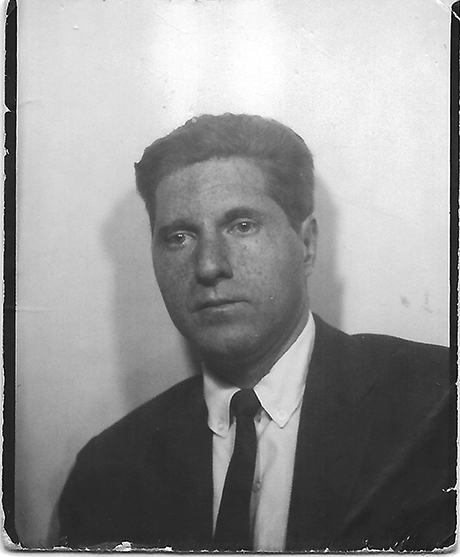
Late 1950s (Photographer unknown)

Marvin Cohen, still going strong in 2018 (Photo: Maggie Beale)
From Library Journal, February 1, 1968:
"Perhaps half or a third of the books I ever read have influenced my own work; especially James Joyce, Kafka, Henry James, some of the French surrealists like Henri Michaux, William Faulkner, and the 18th-Century English prose style; many unconscious influences have been at work, too.
"My work has been influenced by such personal factors as my rather isolated Brooklyn childhood, my semi-deafness from the age of three; my interests in Major League baseball, art, and music; early abortive love life, poverty, the cosmos of New York City, travelings and tattered abundance of jobs, and idlenesses. However, my work hardly ever touches literally on events, being rather surrealistically abstract."
News & Media
The Collidescope: June 1, 2021
"Fame and Famine: The Last Interview with Marvin Cohen" by George Salis
Read interview here.
Marvin Cohen Reading at Queen Elizabeth Hall, London 1973
View slideshow by Colin Myers with this audio on YouTube here.A Celebration of Marvin Cohen at The Cornelia Street Café: May 2, 2018
Video by Williams ColeInchoatia: April 19, 2018
"Marvin Cohen, How to Outthink a Wall: An Anthology (2016)"
Read review here.
Varsity: December 7, 2017
"Book Review: Baseball as Metaphysics by Marvin Cohen" by Reuben Andrews
Read review here.
Fiction Writers Review: June 12, 2017
"The Drumbeat of Society: An Interview with Marvin Cohen" by Nina Buckless
Read interview here.
Village Voice: November 23, 2016
"Surreal Genius: Why Onetime Literary Hotshot Marvin Cohen Deserves Another Look" by Ross Barkan
Read article here.
WNYC Reader's Almanac: February 6, 1978
Marvin Cohen talks about his book The Inconvenience of Living, and reads three selections: "The Inconvenience of Living," "Quiet, Confusion at Work," and "An Amicable Solution."
Listen to interview here.
WNYC Reader's Almanac: December 14, 1976
Marvin Cohen discusses his sixth book and first novel, Others, Including Morstive Sternbump, with host Walter James Miller.
Listen to interview here.
CONTACT
Comments, suggestions, corrections, and additions are welcome. I look forward to hearing from you. Please contact me at the email address below.
Rick Schober
marvincohen [dot] net [AT] gmail [DOT] com